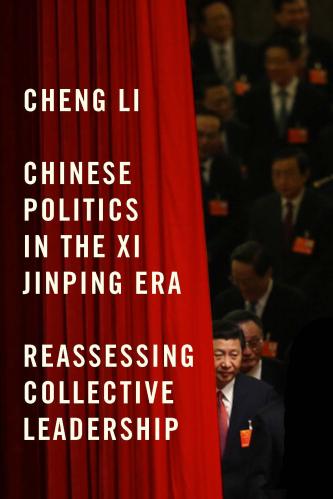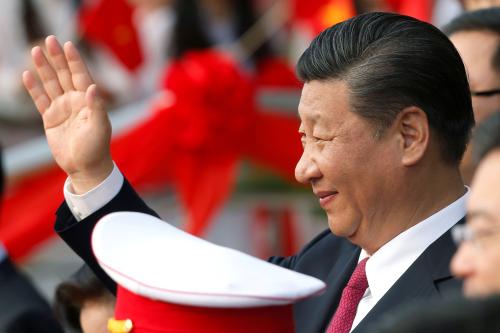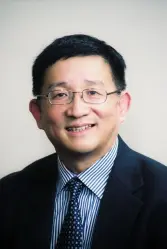To Xi or not to Xi? That is the existential question that will be posed to China’s National People’s Congress in the coming days, as it considers indefinitely handing over the country’s political reins to President Xi Jinping.
The Central Committee of the Chinese Communist Party has proposed removing a clause from the country’s constitution—added during the Deng Xiaoping era—which limits both the presidency and vice presidency to two five-year terms. Undoing this restriction essentially lines Xi up to be “President for Life.”
Another proposed change would enshrine “Xi Jinping Thought on Socialism with Chinese Characteristics for a New Era” in the constitution’s preamble, following Marxism-Leninism, Mao Zedong Thought, and Deng Xiaoping Theory. While ideas promoted by Xi’s two immediate predecessors, Jiang Zemin and Hu Jintao, would also be incorporated, their names would not, thus venerating a trifecta of Chinese leaders—Mao, Deng, and Xi—only to reinforce Xi’s egoism.
These proposed constitutional revisions are the latest—and most historically consequential—power grab by the self-assured Chinese president. Xi, who is on the cusp of his second presidential term, has seized upon his moment at the pinnacle of accrued political capital to avoid becoming a lame duck and to cement his hold over the country for as long as he desires.
The revisions also reflect one of the greatest paradoxes of Xi’s leadership, at once pushing for a greater emphasis on what he calls “law-based governance” and stronger legal institutions while enshrining his name in the law under which he is supposed to govern, not rule over.
At China’s 19th Party Congress last October, Xi refused to field any “sixth-generation” successors as part of the newly formed Politburo Standing Committee. This left him with two potential paths for succession. Some analysts—including us—naively hoped that Xi wanted more time to train, groom, and test a potential successor before identifying the candidate. Others insisted that he would flaunt established institutional norms and stay in power beyond his allotted two terms.
In a disappointing turn for those who have upheld more optimistic prognoses for Xi—and for China—he opted to revert the country back to the era of strongman politics and the personality cult. As a result, he squanders a precious opportunity to institutionalize the peaceful transfer of power in the PRC, undermining the example set by Jiang in 2002 and by Hu in 2012. Equally important, this latest action further alienates a number of critical constituencies whose power Xi may be underestimating.
Liberal intellectuals will be among the first to push back and shape the public discourse. They have been disillusioned by Xi’s leadership ever since 2013, when authorities began cracking down on open discussion of “seven subversive currents,” including constitutional democracy, human rights, civil society, and media freedom. Their perceptions of Xi as a Mao-like figure may now be crystallized.
The political establishment, while certainly composed of some “yes-men” willing to do the president’s bidding, is by no means monolithic. Sooner or later, some political elites may stand up for their belief in the institutionalized norms of the Deng era. Others may see Xi’s reversal of constitutional constraints on term limits as heralding a return to an era of vicious power struggles—a zero-sum game in which they will also ruthlessly engage in the years to come.
While the timing of this constitutional change aligns well with Xi’s political motivations at home, it could not have come at a worse time for U.S.-China relations.
Beginning with the Trump administration’s first national defense strategy, the United States has begun painting China as a “strategic competitor” that is pursuing an authoritarian advance under Xi Jinping. In his most recent State of the Union Address, President Donald Trump asserted that “rivals like China…challenge our interests, our economy, and our values.” Xi’s actions will only play into rising fears about China among Americans, who will further conflate China’s leadership with that of other authoritarian regimes like Russia and Turkey. Such an atmosphere of distrust can only catalyze further administration aggressions toward China.
If the international community views China through an increasingly negative lens, and if criticism from Chinese liberal intellectuals, rival political elites, and the Chinese citizenry gains steam, the result may be a leadership split and political instability in China.
Chinese society has changed profoundly since the Mao era. It has become so pluralistic that any comparisons to that time are anachronistic. But when the proposed constitutional changes are unsurprisingly approved by the National Party Congress next week, it will be left to Chinese society to determine whether to accept the risks of returning to winner-takes-all, strongman politics or instead continue down the path of Deng’s reforms, with a government that incorporates Chinese-style checks and balances and honors the peaceful transition of power.
If Xi pays heed to the warranted criticism, he may moderate his aims, uphold other institutional norms, and maybe even reconsider the wisdom of embarking on a third term. Otherwise, based on his continued consolidation of power and ambitions for the country—and, indeed, himself—Xi’s “new era” may resurrect an old problem.
The Brookings Institution is committed to quality, independence, and impact.
We are supported by a diverse array of funders. In line with our values and policies, each Brookings publication represents the sole views of its author(s).








Commentary
China’s constitutional conundrum
February 28, 2018